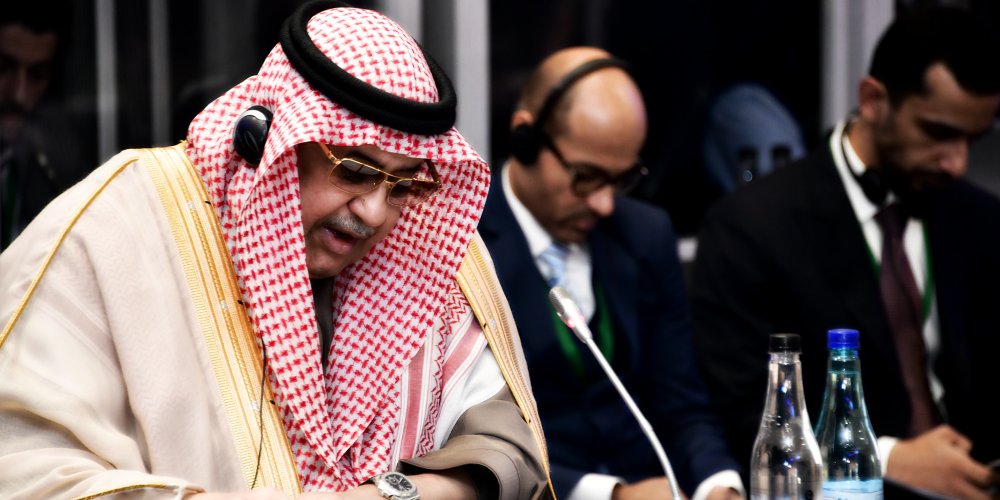-
The Importance of Prayer: How a Christian Gold Company Stands Out by Defending Americans’ Retirement
(Natural News)—The oil-rich kingdom of Saudi Arabia has formally joined the BRICS group alongside four other countries.
South African International Relations Minister Naledi Pandor confirmed the full membership of Saudi Arabia, Iran, Egypt, Ethiopia and the United Arab Emirates (UAE) during a Jan. 31 press briefing in the capital Pretoria. The five nations accepted the invitation from the BRICS core group extended during a summit last year. She also told members of the media that Russia, which takes over as the group’s chair from South Africa, has received written interest from 34 countries that want to join.
According to Pandor, Argentina has been accepted as a full member of the BRICS group. However, Argentinian President Javier Milei reversed course and instead strengthened relations with the West. “Argentina has written to indicate that they will not act on this successful application by the previous administration to become full members of BRICS, and we accept their decision,” she said.
The South African minister added that she and her colleagues in the group are developing a so-called BRICS partner country model. This model, Pandor said, would accommodate 17 nations that weren’t accepted as full members.
Moreover, she mentioned that the group is also devising a framework to allow members to use their local currencies for inter-BRICS trade. According to her, the group found the current international payment system that uses the U.S. dollar to be “unfair and costly.”
Ullas Rao, an assistant professor at Heriot-Watt University‘s Edinburgh Business School, noted that the inclusion of Riyadh and Abu Dhabi in BRICS is a “particularly noteworthy” development. With the two oil giants’ substantial sovereign wealth funds, they are poised to create significant growth opportunities in BRICS through investments, trade and commerce.
“The expansion of the BRICS multilateral bloc to include Saudi Arabia and the UAE augurs extremely well, amid ongoing geopolitical and economic challenges confronting the world economy,” he told Economy Middle East.
BRICS grows to 10 members from initial 5 core countries
According to Bloomberg, leaders of the five core BRICS nations – Brazil, Russia, India, China and South Africa – “agreed to enlarge their BRICS group from Jan. 1 at a summit held in Johannesburg in August” of last year. The inclusion of the five new members, which expands the group to 10 nations, took effect on the same day as Russia assumed BRICS’ rotating chairmanship.
Russian President Vladimir Putin welcomed the five new member nations in an official statement. He said: “BRICS is attracting an ever-increasing number of supporters and like-minded countries that share its underlying principles – namely, sovereign equality; respect for the chosen path of development; mutual consideration of interests; openness; consensus; the aspiration to form a multi-polar international order and a fair global financial and trade system; and pursuit of collective solutions to top challenges of our time.” (Related: Saudi Arabia fortifies relations with Russia, thumbing its nose to the West.)
Ayham Kamel, head of the Middle East and North Africa research team for consultancy firm Eurasia Group, commented on the development. He specifically zeroed in on the inclusion of Riyadh, Abu Dhabi, Tehran and Cairo in the BRICS group.
“The prospect of Saudi Arabia, the UAE, Iran and Egypt joining BRICS creates new mechanisms that force a degree of political cooperation by all the countries,” Kamel said. “The Arab countries are looking [to improve] their global geopolitical influence.”
Head over to DeDollarization.news for more stories about BRICS. Watch Gregory Mannarino explains why Saudi Arabia’s BRICS membership poses a direct threat to the petrodollar.
This video is from the High Hopes channel on Brighteon.com.
More related stories:
- Saudi Arabia, UAE and Iran among six countries invited to join emerging BRICS global superpower.
- Dollar dominance scheduled for TERMINATION as Saudi Arabia declares CHINA its “reliable partner.”
- China bank collapse under way; Saudi Arabia distances from the petro dollar to join BRICS monetary order.
- BRICS to lay foundation for EXPANSION: 13 Nations formally asked to join group, 6 others expressed interest.
- End of petrodollar edges closer as Saudi Arabia looks set to join new China-dominated ‘BRICS’ economic alliance.
Sources include:
-
Learn the TRUTH about Gold IRAs and how most precious metals companies play dirty.



